

Section

Back
What Is Cortisol and Why Balance Matters
Cortisol is also known as the body’s master stress hormone and is produced by the adrenal glands.

Cortisol is a life-saving hormone essential for maintaining metabolic, immune, nervous system, and endocrine health, as well as for survival.
However, excess cortisol caused by chronic stress, chronic pain and inflammation, gut health issues, or other conditions can lead to fatigue, hormonal imbalance, digestive health issues, trouble sleeping, and HPA Axis dysfunction—commonly known as adrenal fatigue or burnout.
This is why maintaining cortisol with lifestyle practices and herbs for cortisol balance is crucial for optimal physical, mental, and emotional well-being.
Understanding Cortisol from an Ayurvedic Perspective
Ayurveda has long recognized the adverse effects of chronic stress and imbalanced cortisol levels on human health.
This is apparent given the enduring popularity of specific Ayurvedic adaptogens (herbs that reduce stress) such as Ashwagandha and Tuli (Holy Basil).
However, Vedic practitioners view cortisol imbalance as an imbalance of Vatta and Pita doshas, which can affect nervous system function, digestion, stress response, sleep, and mental/emotional health.
An Ayurvedic approach typically focuses on restoring balance by addressing nervous system health, fortifying the stress response, calming the mind, and restoring a sense of groundedness in one’s body, mind, and spirit.
This is an elementary explanation of a basic Ayurvedic perspective on cortisol, and approaches will vary.
However, practitioners often recommend foundational herb adaptogens as a starting point for rebalancing the Doshas and calming the body’s stress response.
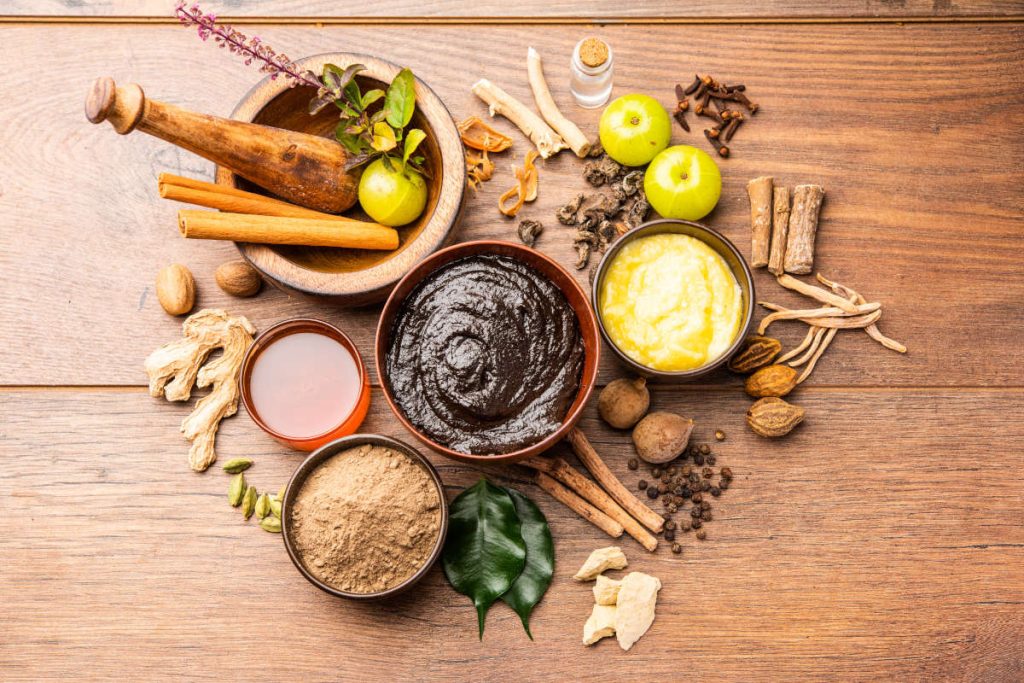
7 Herbs for Cortisol Balance and Stress Relief
Adaptogens are among the most popular Ayurvedic herbs for supporting cortisol levels and reducing stress.
Adaptogens exist all over the world and grow primarily in harsh, challenging climates, such as high altitudes, which speaks to their effects on resilience and vitality.
The following are seven traditional herbs for cortisol balance, stress relief, better sleep, a peaceful mind, and overall emotional well-being.
1. Ashwagandha
Also known as Winter Cherry, Indian Ginseng, or Withania somnifera, Ashwagandha is a cherished Ayurvedic adaptogen and rasayana (rejuvenator) widely used as an herb to support cortisol levels.
Its name loosely translates to “strength of a stallion” or “strength of a horse” which speak to its properties for enhancing the resilience and vitality of body, mind, and spirit.
Ashwagandha has been extensively researched, with studies showing that it can significantly reduce cortisol levels, improve various aspects of sleep quality, support thyroid health, alleviate stress, and even aid in exercise recovery.
Learn more in: Ashwagandha For Sleep Or Energy? Both Please!
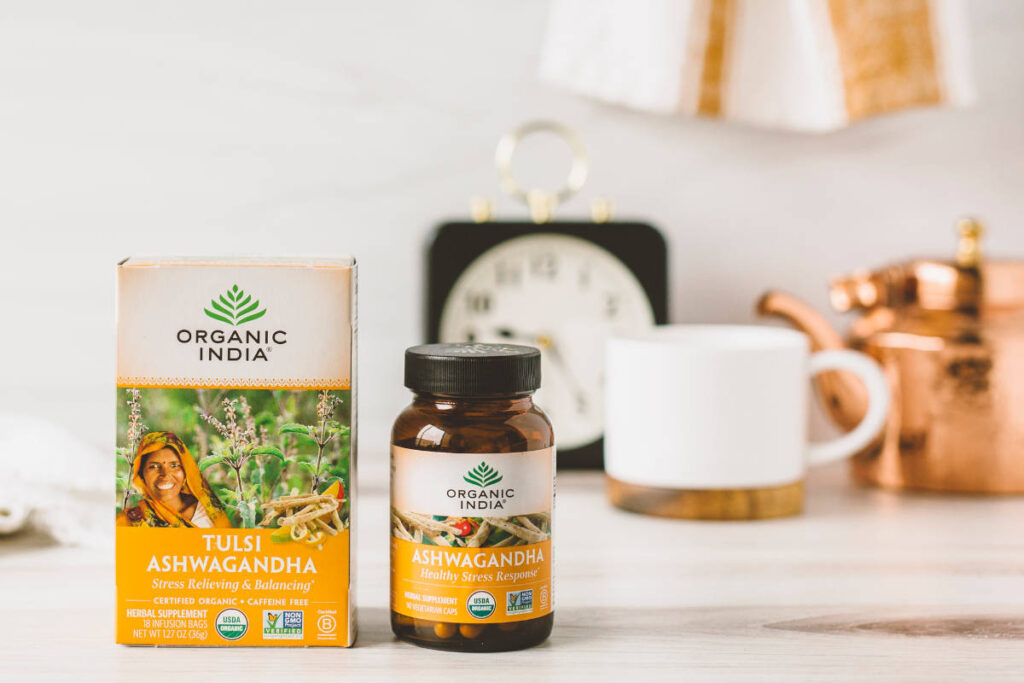
2. Tulsi (Holy Basil)
Known as “the queen of herbs” and “liquid yoga”, Tulsi is considered a sacred adaptogenic herb in Ayurveda, and one of the best herbs for cortisol balance as a stress-reducing tonic.
Research has shown Tulsi supports normal cortisol balance and reduces stress, thereby having a positive effect on emotional well-being, sleep, and overall contentment.
In Ayurveda, Tulsi tea is often consumed before meditation or after a yoga practice to help calm the mind and enhance spiritual awareness and presence.
Discover more about the magic of Tulsi tea in: 5 Surprising Tulsi Tea Benefits
3. Amla
Although it’s not an adaptogen, Amla, also known as Indian Gooseberry, is often recommended alongside adaptogens due to its protective antioxidant properties, which can help keep cells healthy during times of prolonged stress.
Emerging research that also suggests it may help reduce the adverse effects of stress on physical and mental health; however, further research is needed.
Amla may be recommended as a single herb supplement or in Triphala for extra digestive and antioxidant support.
Related reading: Amla Powder Benefits: Superfruit for your Wellness Ritual
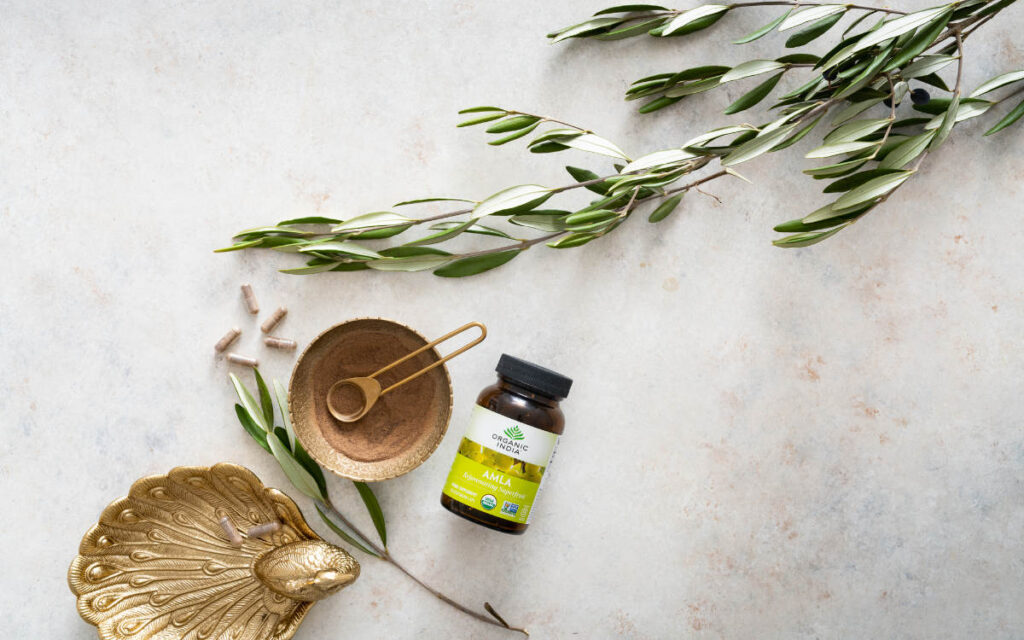
4. Schisandra
Commonly used in traditional Russian, Traditional Chinese, Japanese, and Ayurvedic herbalism, Schisandra is the herb from which the term “adaptogen” was coined.
Schisandra, also known as Schisandra chinensis or five flavor berry, is unique in that it possesses five flavors, salty, sweet, spicy, sour, and bitter, similar to Amla but more warming.
Research has shown that schisandra lives up to its adaptogenic reputation, suggesting it may support a healthy nervous and neurological system, relieve stress, and promote normal liver function, inflammatory response, and immune function.
Related reading: The Six Tastes of Ayurveda Explained
5. Brahmi (Bacopa)
Bacopa, also known as Brahmi, is considered a nootropic (brain tonic), medhya rasayana (rejuvenator of the intellect), a nervine (calms the nervous system), and an adaptogen.
Best known for its cognitive support prowess, Brahmi is often recommended alongside other adaptogens to help:
- Calm an overactive mind
- Deepen meditation
- Reduce stress
- Soothe the nervous system
Think of Brahmi as the ultimate reset and nourishment for brain and spiritual burnout.
Research has shown Brahmi may help reduce cortisol levels, support various aspects of healthy cognitive function, and may possess neuroprotective properties.
Discover more about Bacopa in: Bacopa in Ayurveda: Consciousness and Clarity
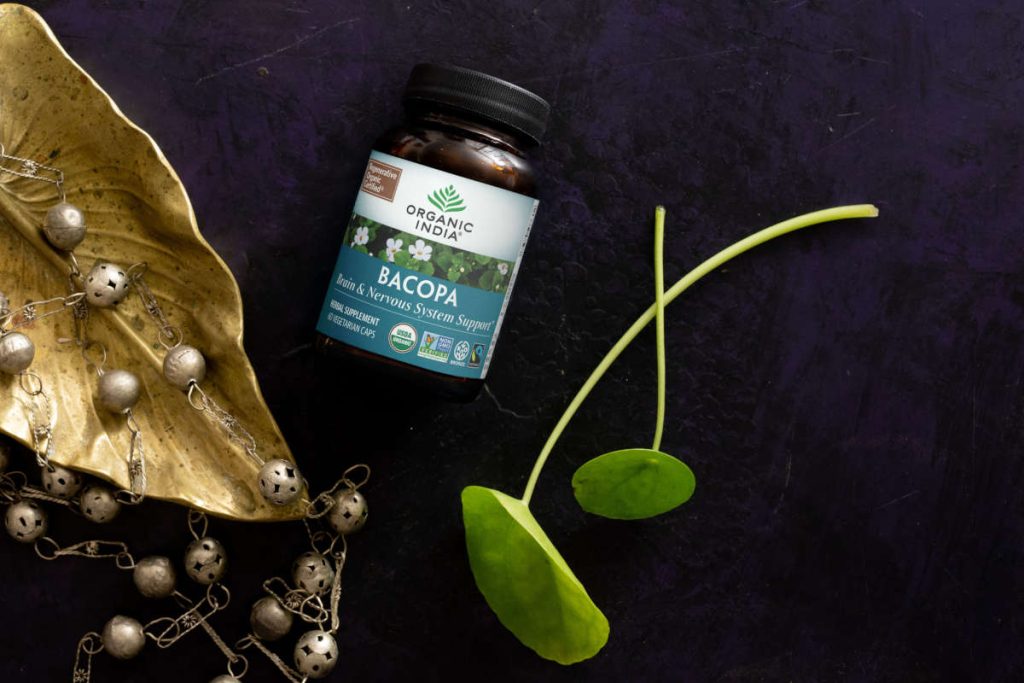
6. Rhodiola
Rhodiola Rosea, also known as Russian Ginseng, comes from the harsh mountain ranges of Russia, where it is still cultivated and harvested.
This rose-scented plant is a powerful adaptogen, with research showing it can reduce cortisol levels, ease stress, promote optimal physical and mental performance, and support emotional well-being.
7. Shatavari
Also known as “the queen of herbs” alongside Tulsi, Shatavari is considered the ultimate female tonic.
Often translated as “she who possesses a thousand husbands”, this herb is considered an adaptogen and a rasayana (rejuvenating herb). It’s also frequently used to increase Ojas, the subtle essence of all vital fluids responsible for health, vitality, strength, longevity, immunity, emotional wellbeing, and spiritual growth, thereby invigorating body and mind.
Research suggests that Shatavari’s antioxidant and adaptogenic properties positively impact the HPA axis, nervous system, and inflammatory response, thereby imparting natural stress relief and resistance, hormonal harmony, enhanced energy, and calm focus.
Learn more about the queen of herbs in: Benefits Of Shatavari For Female Wellness
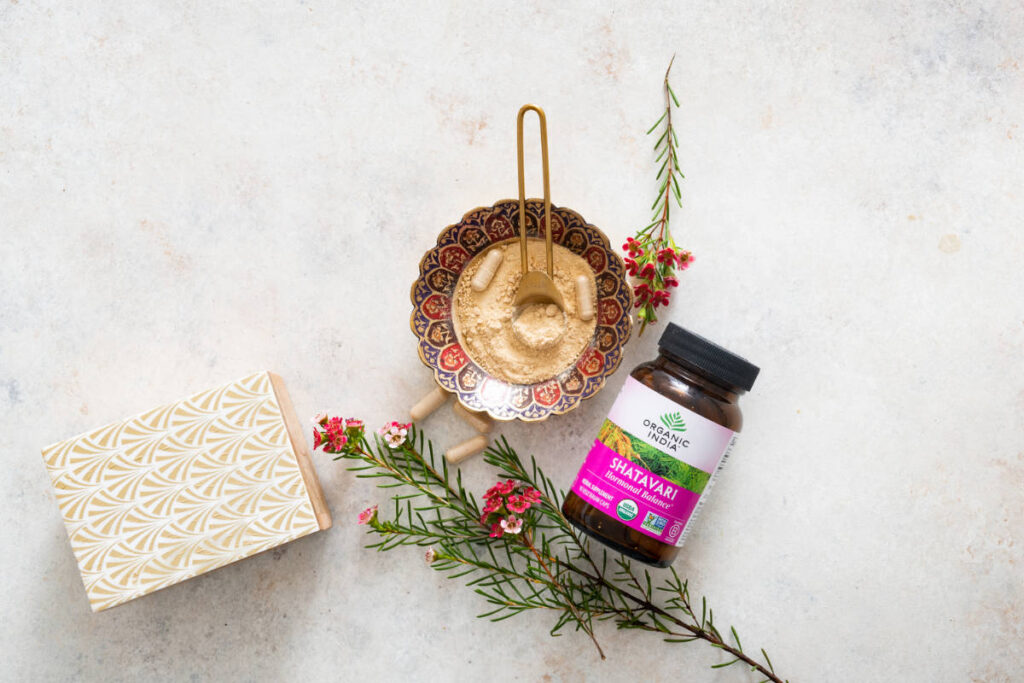
Daily Habits to Support Healthy Cortisol Levels
In addition to herbs for cortisol balance, which are a wonderful tool, lifestyle is just as important—if not more so.
The most effective way to support healthy cortisol levels permanently is to reduce and/or reframe your relationship with stress.
Since we cannot avoid stress completely, the best way to do this is to practice stress management techniques daily.
It doesn’t need to take a lot of time, but it can make all the difference to your physical, mental, and emotional health.
Here are some lifestyle practices to try that will reduce stress and promote a balanced outlook:
- Practice yoga
- Drink tea
- Cultivate community and positive relationships
- Laugh often
- Get enough sleep
- Practice mindfulness and/or pray
- Exercise
- Spend time in nature
- Limit social media and screen time
- Spend time with people who lift you up versus bring you down
- Cultivate purpose and wisdom
- Read uplifting literature and content
- Help others
- Spend time with pets or helping animals
- Set healthy boundaries and practice saying “no”
- Spend time working on a hobby you enjoy
- Practice deep breathing and breathwork
For more inspiration, see: 7 Self Nurturing Activities for Inner Peace and Prosperity

Let’s Recap the Top Herbs for Cortisol Balance and Support
We’ve covered a lot about cortisol today, but there’s always more to learn, so let’s recap the best herbs for cortisol and where to find them.
Organic India offers a range of traditional, organic, and regeneratively grown Ayurvedic herbs and herbal formulas to help reduce stress, calm the nerves, promote healthy sleep, and foster peace of mind, including:
- Ashwagandha: In capsules, gummies, or bulk powder
- Tulsi (Holy Basil): In capsules, various teas, and bulk loose herb
- Amla: In capsules, powder, or in Triphala capsules and bulk powder
- Shatavari: In capsules as a single herb or in Essential Female blend
- Brahmi (Bacopa): In capsules as a single herb or blends like Memory, Joy!, and Tulsi Breakfast Tea
We do not currently offer Schisandra and Rhodiola.
However, we recommend choosing brands made from sustainability, ethically, and legally-sourced plants. Rhodiola especially requires specific cultivation. harvesting, and exportation to protect endangered plants.
Discover more about these top herbs for cortisol in: Your Guide To Adaptogens Vs. Nootropics

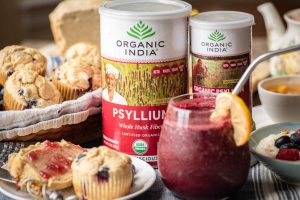
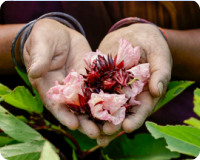

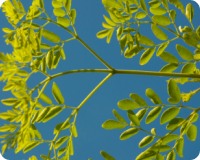

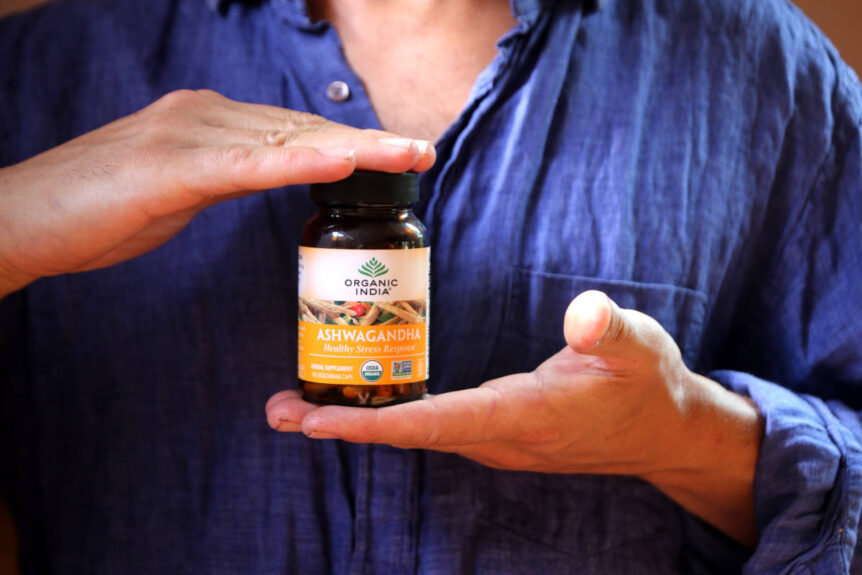
 Kristen Boye is a freelance natural health and green living writer, copywriter, and editor. Kristen was raised on an organic farm in British Columbia which inspired her life’s work. She holds a Bachelor’s Degree in Natural Health, is a Certified Natural Foods Chef, a medicinal herb farmer, natural foods advocate, and is obsessed with writing, homesteading, researching, regenerative agriculture, and words in general. Kristen lives with her husband and two children on their medicinal herb farm in Western North Carolina. Visit her online at:
Kristen Boye is a freelance natural health and green living writer, copywriter, and editor. Kristen was raised on an organic farm in British Columbia which inspired her life’s work. She holds a Bachelor’s Degree in Natural Health, is a Certified Natural Foods Chef, a medicinal herb farmer, natural foods advocate, and is obsessed with writing, homesteading, researching, regenerative agriculture, and words in general. Kristen lives with her husband and two children on their medicinal herb farm in Western North Carolina. Visit her online at: